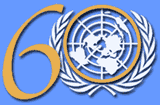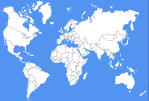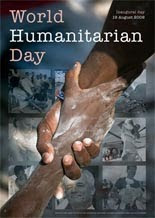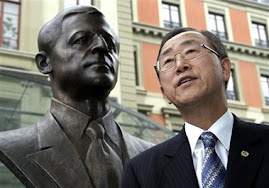[Dateline: New York Authors: iSeek]
UN staff around the world observed the first-ever World Humanitarian Day on Wednesday, 19 August, paying tribute to the colleagues lost in the line of duty, as well as those who undertake humanitarian work for the United Nations and its partners in many difficult places around the world.The day’s events were spearheaded by the Office for the Coordination of Humanitarian Affairs (OCHA).
Established last December by the General Assembly ( A/RES/63/139 ) , the date was chosen to mark the date of the 2003 bombing of the Canal Hotel in Baghdad which killed 22 staff members, including the top United Nations envoy in Iraq, Sergio Vieira de Mello, and wounded more than 150.
Organizers of World Humanitarian Day hope the annual celebration will increase public understanding of humanitarian assistance world wide as well as honoring humanitarian workers who have lost their lives or been injured in the course of their work.
SG message for the day
New York
The Secretary-General attended two related events on Wednesday morning – a somber wreath-laying ceremony to honor those killed in Baghdad six years ago and the launch of an exhibition of posters and photographs capturing images of humanitarian workers in action.In his remarks, the SG said “Each year on August 19th, we will honour the memory of fallen humanitarians. We will pay tribute to the dedicated men and women who are out there among the vulnerable, providing hope and help. And we will draw the world's attention to the great magnitude of suffering in our world that needs our urgent attention.”
He added, “For my part, I pledge to do all that I can as Secretary-General of the United Nations to help victims while protecting the security and independence of the people who work so hard to save them”( full remarks ). Joining Mr. Ban at the Headquarters ceremony was Assistant Secretary-General for Humanitarian Affairs Catherine Bragg who noted that aid workers are working in ever more dangerous conditions.
“The last two years have been successively the most deadly for aid workers on record,” she stated. “Too often, UN and NGO flags and emblems are no longer protections but provocations.”
Geneva
Considered by many to be the humanitarian capital of the world, an inter-agency event took place in Geneva’s Parc des Bastions which included participation from Swiss and Geneva authorities as well as the various agencies working in the humanitarian field.
In his remarks, Director-General Sergei A. Ordzhonikidze highlighted the sad figures from last year stating that “a record of 260 humanitarian aid workers from different agencies and charities were victims of kidnappings and attacks, including 122 who were killed.”
Also speaking was Mrs. Annie Vieira de Mello, widow of Sergio Vieira de Mello, who spoke about the foundation which has been set up in her late husband’s memory.
The event also included wide range of music from different parts of the world and some fine culinary tastes from Senegal and, of course, Brazil.
Other events
A number of events were held in various UN offices around the world including Chad, Democratic Republic of Congo, Dubai, Ethiopia, Fiji, Indonesia, Iraq, Kenya, Myanmar, Nepal, New Zealand, the occupied Palestinian territories, Somalia, Sri Lanka, Thailand and Zimbabwe.
Staff from the UN Information Centres in Beirut and Warsaw were particularly instrumental in getting the word out about the day in Arabic, French and Polish by participating in several radio interviews and generating a high-level of traditional and online media coverage.
The following is a short overview of some of these events.
Democratic Republic of the Congo
In the Democratic Republic of the Congo a two-hour event was organized with some 200 guests from the press, the government, humanitarian partners, donors and NGOs, followed by live broadcasting in collaboration with Radio Okapi , the UN peacekeeping mission’s radio.
Kenya
Activities organized by OCHA in Kenya focused on “the Human Face of Drought” and included an IRIN (Integrated Regional Information Networks) photo essay on drought and the dissemination of posters on this theme.
Nepal
OCHA’s ceremony in Nepal featured screenings of films on humanitarian action in the country, a musical interlude and personal tributes to humanitarian workers by colleagues, in the presence of government officials.
Pakistan
In Pakistan, the UN Information Centre in Islamabad held discussion forum with the heads of national and international print and electronic media in advance of the day on 6 August with Humanitarian Coordinator Wolfgang Herbinge and communication specialists from OCHA, the World Food Programme and UNICEF which resulted in a high-level of interest from the media in the country.
Also appreciated was the UNIC’s translation of material into one of the local languages, Urdu.
Awards for best print and broadcast media on the humanitarian crisis in Pakistan were announced. The honorary award will be given out on UN Day in October.
Sudan
OCHA’s office in Sudan launched a joint UN/NGO online photo exhibition depicting humanitarian, early recovery, recovery and development work while local TV stations also broadcasts a public service announcement.
Tanzania
The UN System in Tanzania’s observance was coordinated by UNIC Dar es Salaam and held at the UN compound under the leadership of Acting UN Resident Coordinator, Mr Ronald Sibanda.
During the event, UN flag was hoisted followed by a minute of silence observed by government representatives, members of the media and staff in attendance.
Link,http://www.un.int/wcm/content/site/portal/cache/offonce/home/pid/10617;jsessionid=13149E379C11D6D24FBC37B1DEB26FC4, consultado a 26 de Agosto de 2009








